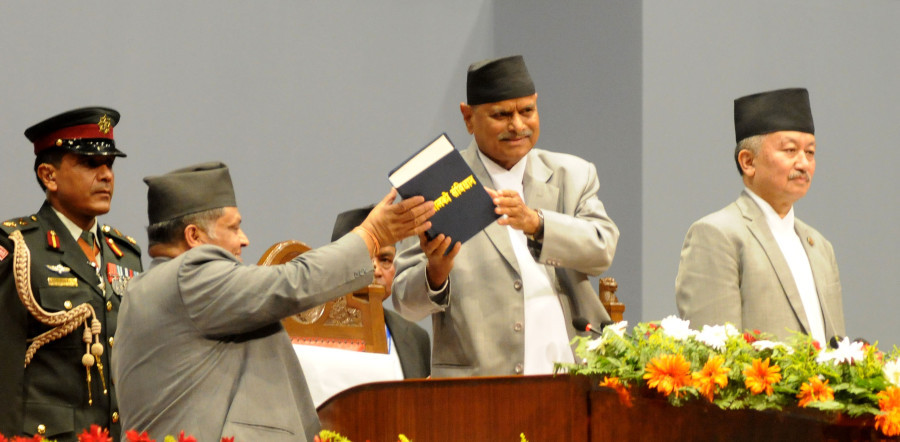Columns
Time to amend the constitution
Nepal stands at a crossroads where constitutional amendments can pave the way for a prosperous future.
Khim Lal Devkota
The 2015 Constitution marked a significant milestone in Nepal’s political history. Its formal implementation began with the election of the three levels of government—federal, provincial and local—in 2017. As Nepal enters a new phase of its political evolution, it is an opportune moment to consider necessary amendments to the constitution to strengthen federalism and democracy. The Post also published an editorial titled 'Easy does it' this Monday, highlighting the complexities involved in this process.
The Nepali Congress and the Communist Party of Nepal (UML), the two major political parties, claim to have agreed to amend the constitution. If so, this is a positive step toward addressing critical governance issues. However, alliances and agreements between these major parties are precarious and prone to change, threatening political stability. There are talks of forming a national consensus government and amending the constitution, but the possibility and impact of such an endeavour remain questionable.
Nine years after its promulgation, the constitution’s shortcomings and inconsistencies have become evident. A severe review of the constitution's implementation is necessary, and reforms and amendments must address these issues. The constitution should be seen as a dynamic and living document, not merely a source of problems. This approach emphasises continuous improvement to reflect the evolving political and social environment.
A good constitution alone does not ensure good governance; it requires competent, sincere and committed leaders. The constitution issued by the Constituent Assembly is certainly an improvement over previous versions, but its implementation has been slow. Provincial and local governments have struggled to exercise the rights granted by the constitution. For instance, the constitution assigns provinces the exclusive right to exercise police powers, but this has not been allowed in practice.
Frequent changes in power have caused dissatisfaction among citizens. While the United States has maintained the same federal constitution and governance system for over two centuries, Switzerland has had the same federal system for 176 years, Canada for 157 years, and India for 74 years. These countries have undergone repeated constitutional reforms to ensure stability. In contrast, Nepal has seen numerous changes in its governance system and constitution.
Federalism is the cornerstone of Nepal's constitution. The issue lies not in the constitution itself but in its implementation by the rulers. Instead of addressing constitutional loopholes, leaders have exacerbated them. Reforms in the electoral system are essential to achieving stability and a better federal governance system. Nepal’s mixed electoral system has led to coalition governments. While some people lament that small parties play disproportional roles in the coalition culture, a coalition of diverse parties can also bring more comprehensive ideas and solutions for the country’s development. However, individual interests have often taken precedence over national interests, leading to a lack of collective accountability. Therefore, reform of the electoral system is inevitable.
A significant debate revolves around whether to reduce the seats allocated for proportional representation in the House of Representatives. The proportional representation system was designed to ensure fair representation for women, Dalits and marginalised communities. Removing this system altogether, or even reducing its weightage, without addressing the underlying issues of representation, would be inappropriate and counterproductive. The fault lies not in the electoral system but in the political leadership that constantly changes alliances.
Some politicians and analysts have proposed direct election of the Prime Minister and Chief Minister, which could lead to more stable governments. This change would require making parliamentary elections entirely proportional, ensuring that MPs focus on law-making and government oversight. They also propose reforming the structure of the provinces, as the current federal system does not appear to function effectively.
Reducing the number of Members of Parliament (MPs) is necessary. The House of Representatives (HoR) currently has 275 seats, and the Provincial Assemblies together have 550 seats. The large size of the HoR and the provincial assemblies has resulted in huge expenses. The first-past-the-post (FPTP) voting system should ensure that everyone is directly elected, and the number of MPs should be adjusted accordingly. Reducing the number of MPs elected through the proportional electoral system—currently 110 in the HoR and 220 in the provincial assemblies—will also address the high costs associated with federalism. However, in the FPTP system, those elected via the proportional electoral system, such as women, Dalits and other marginalised communities, should be addressed with reserved constituencies. In such cases, elections should be held exclusively within these groups.
The proportional electoral system is not inherently flawed. However, it has often benefited those with political connections or financial influence. To address this, proportional candidates should be elected based on joint votes from political parties and candidates, ensuring the people approve them. Amendments should include fixing the tenure of the Prime Minister, similar to the President and local level heads, who have two tenures. The PM should not serve more than two terms. Limiting MPs from becoming ministers can also reduce political corruption. Reducing the number of ministers is crucial; the current provision for up to 25 ministers is excessive. With the provincial and local levels taking more responsibilities, the number of ministries at the federal level should be reduced by half.
Nepal's federal system must also streamline the number of departments and ministries. Many existing departments play insignificant roles and should be abolished or transferred to provinces. Stability at the provincial level is another critical issue. Frequent changes of Chief Ministers have led to public discontent. Direct elections for Chief Ministers can enhance accountability and stability. The constitution should be amended to allow the Vice President to become the Chairperson of the National Assembly. This will reduce additional expenses and enhance the role and effectiveness of the National Assembly.
Amending the constitution requires a two-thirds majority in both houses of Parliament, which the Congress and the UML alone cannot achieve. Forming a national consensus government is necessary to garner the required support. However, significant contradictions among the parties on constitutional issues make it challenging to reach a consensus. These contradictions need to be addressed through dialogue and compromise to move forward effectively.
The constitution outlines formal roles and duties and expects certain behaviour from political and institutional actors. Political parties, leadership, parliament, judiciary and constitutional bodies must establish actions aligned with the constitution's essence. Without this alignment, politics cannot gain people’s trust, and the Constitution becomes merely a tool for gaining power.
Judicial reforms are also crucial for constitutional stability. The constitution must be amended to address these issues comprehensively. Disillusionment and mistrust towards political leadership and politics in general are prevalent. This sentiment stems from the opportunism of political leaders rather than the constitution and the system. We need a new generation of leaders who can feel the changing aspirations of society and maintain relevance in politics. Leadership should focus on long-term national interests rather than short-term personal gains.
Nepal stands at a crossroads where constitutional amendments can pave the way for a more stable and prosperous future. The collaboration between major political parties and the lessons from international experiences underscore the importance of these reforms. By addressing the current challenges and ensuring proportional inclusive representation, Nepal can strengthen its federalism and democracy, fulfilling the aspirations of its people.
Finally, amending the constitution alone will not solve the problems unless it is accompanied by a change in political culture and leaders’ attitudes and actions. Political stability and effectiveness depend on the commitment of political actors to uphold the principles of the constitution and work towards the common good. This holistic approach is essential for ensuring the constitution remains a robust and guiding document for the nation’s future.




 20.53°C Kathmandu
20.53°C Kathmandu















